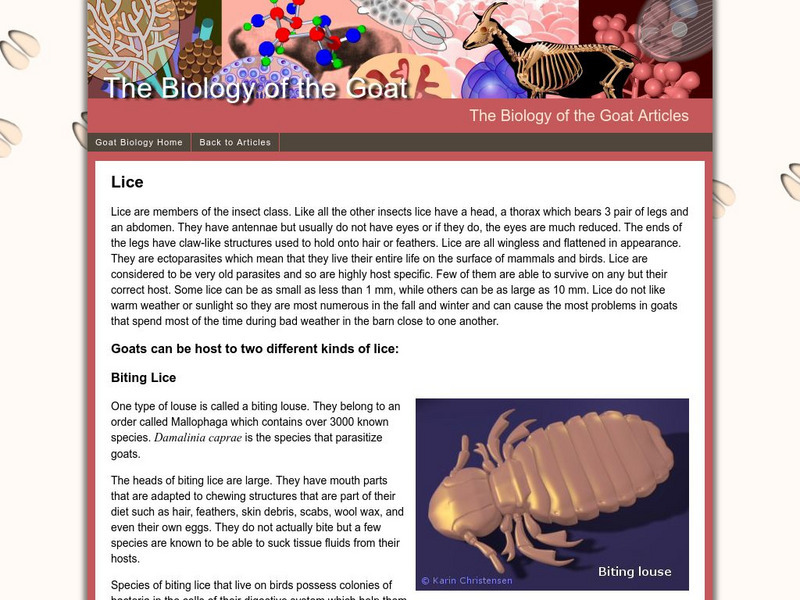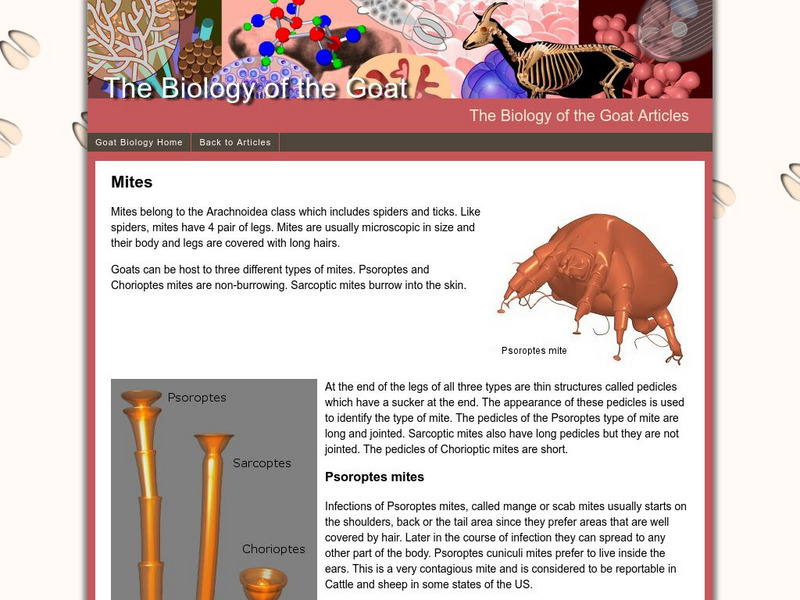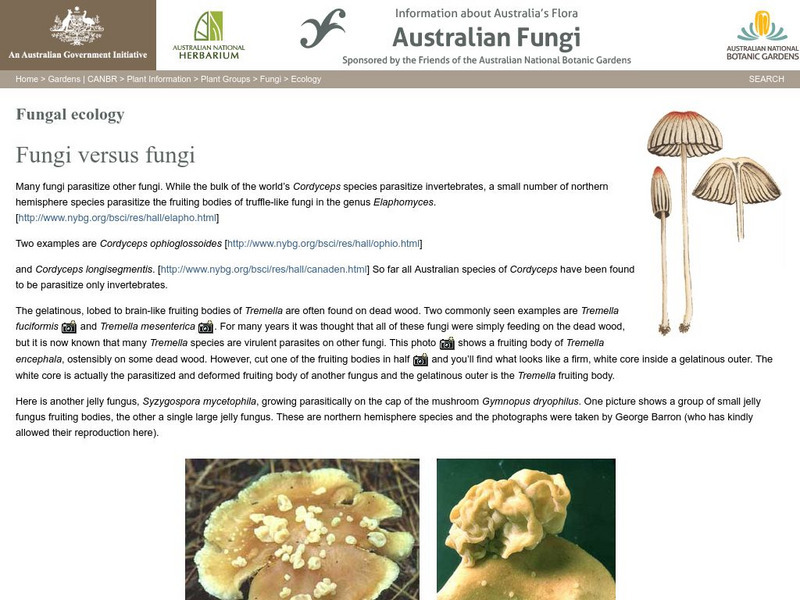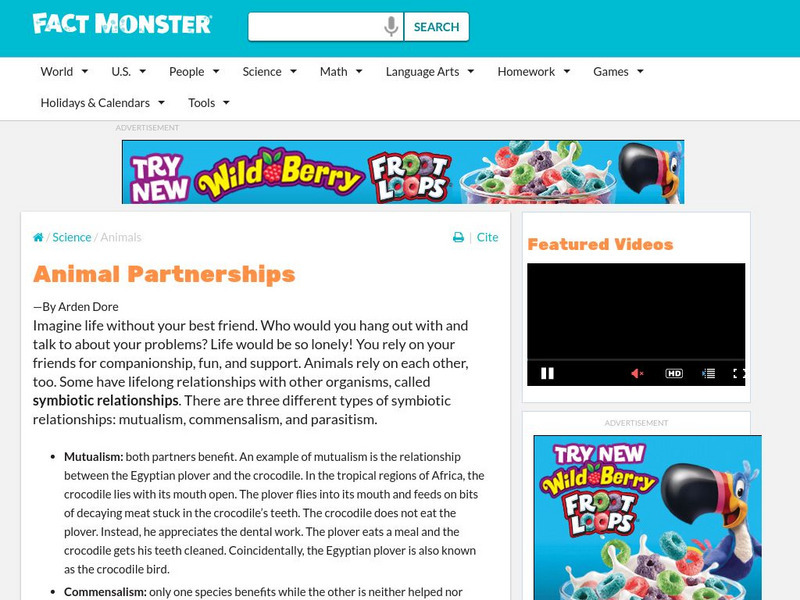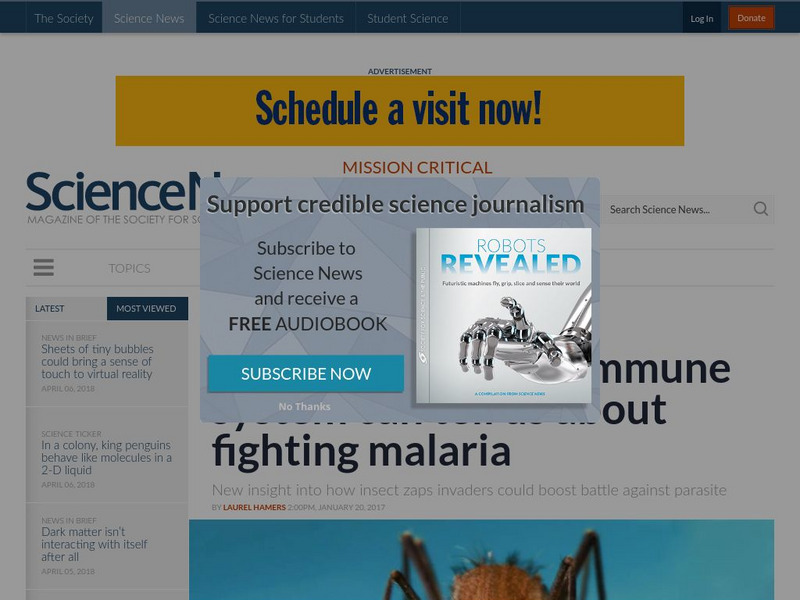Other
Biology of the Goat: External Parasites Lice
This effective site discusses biting lice, sucking lice, their life cycle, and treatment.
Other
Biology of the Goat: External Parasites Mites
This competent site discusses the three different types of mites that goats can host. A life cycle of mites is described as well.
Other
Biology Guide: Pathogens and Disease
Students learn about pathogens and disease. Some topics explored in the tutorial are bacteria, parasites, gene technology, and non-communicable diseases.
CK-12 Foundation
Ck 12: Biology: Symbiotic Relationships of Fungi
[Free Registration/Login may be required to access all resource tools.] Discusses parasitic and mutualistic relationships of fungi.
BiologyWise
Biology Wise: Roundworm Characteristics
Describes roundworm characteristics, including their classification, habitat, reproduction, infection of humans and pets, and how they are transmitted to other hosts. Includes some examples and the diseases they cause.
World Health Organization
World Health Organization: Schistosomiasis
This site from the World Health Organization provides brief information on schistosomiasis. Includes links to related information such as descriptions of activities, reports, news and events, as well as contacts and cooperating partners...
Science Education Resource Center at Carleton College
Serc: Mn Step: The Flow of Energy: Balancing Ecosystems
A lesson outlining activities for a science unit where students can learn about the relationships and the flow of energy within an ecosystem. These include predator and prey, hosts and parasites, and consumers, producers, and decomposers.
Australian National Botanic Gardens
Australian Government: Fungi Versus Fungi
This enlightening site examines how certain fungi parasitize other fungi.
Curated OER
Malaria Foundation International: Life Cycle of the Malaria Parasite
This site has a diagram of the life cycle of the malaria parasite.
Science Struck
Science Struck: Symbiotic Relationships in the Rainforest
Explains what mutualism, commensalism, and parasitism are.
Science Struck
Science Struck: Symbiotic Relationships in the Tundra
Explains what mutualism, commensalism, and parasitism look like in a tundra biome.
Fact Monster
Fact Monster: Animal Partnerships
A description of animal relationships of mutualism (symbiosis), commensalism, and parasitism. A real life example is given for each type.
University of Michigan
Animal Diversity Web: Subclass Hirudinea [Leeches]
This resource gives a brief description of the subclass Hirudinea and the role they have played in medicine.
Other
Ancestral Flatworms
Gives the history of flatworms and how they evolved. Gives the different types of flatworms, including the tapeworm.
PBS
Pbs Teachers: Volcanoes of the Deep
Discuss how individual organisms and groups of organisms interact with each other, and research and classify symbiotic relationships between individual organisms of different species.
Other
Nematoda General
Information on nematodes in general, including their general characteristics and their effect on the environment.
Curated OER
Kids Health: Hey! A Tick Bit Me
This site is provided for by Kids Health. Learn more about ticks, the diseases they can carry, how to avoid them, and what to do if you are bitten by a tick. Watch a demonstration of how to remove a tick and what to do with it after...
BiologyWise
Biology Wise: What Are the Different Types of Flatworms
Describes the basic characteristics of three of the major kinds of flatworms, including tapeworms, planarians, and flukes.
Other
What a Mosquito's Immune System Can Tell Us About Fighting Malaria
Scientists are studying how mosquitos are able to fight off the parasites that humans seem to be unable to battle. Research is being done to help understand what slows or stops these parasites in the mosquito to protect them in an effort...
Other
Nutrition Action: Water, Water, Everywhere
The Center for Science in the Public Interest offers a discussion of contaminants that can be found in tap water and chemicals added to water in the public water systems. The topics discussed are arsenic, parasites, lead, turbidity, and...
TeachEngineering
Teach Engineering: Biosensors for Food Safety
How can you tell if harmful bacteria are in your food or water that might make you sick? What you eat or drink can be contaminated with bacteria, viruses, parasites and toxins pathogens that can be harmful or even fatal. Students learn...
Iowa State University
Iowa State University: Iowa Insect Information Notes Mosquitoes
Mosquitoes are universally considered pests and they can carry dangerous parasites that can make people sick. This article is about controlling mosquitos around the home.
World Health Organization
World Health Organization: Leishmaniasis
A summary of the facts concerning this Protist parasite. A wide range of topics are presented along with an animated life cycle.
Other
Pet Coach: Hookworms (Ancylostoma Uncinaria)
PetCoach offers a full description of hookworms, a common intestinal parasite often found in dogs and cats but with the ability to infect humans. Content explores the life cycle of hookworms, the signs and symptoms of a hookworm...
Other popular searches
- Mutualism Parasitism
- Brood Parasitism
- Symbiosis Parasitism
- Parasitism Activity
- Ecology Parasitism
- Mutual Ism Parasitism
- Parasitism Activity Puzzle
- Mutualism, Parasitism
- Mutual Ism, Parasitism
